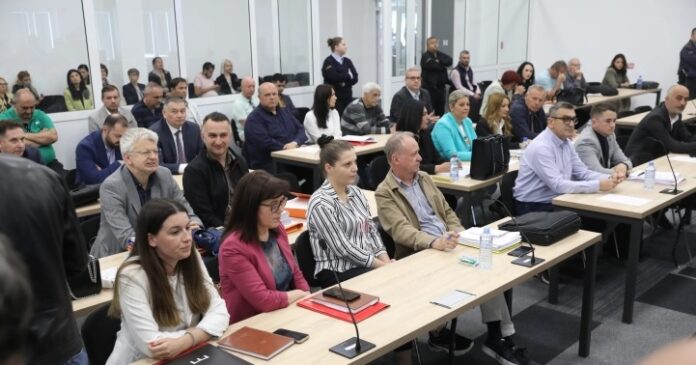The shortage of qualified personnel is a major obstacle to European defense plans

Pavel CHALL believes that the Czech company it works for could easily increase the production of its rocket and drone engines and double its workforce. If only he could find staff.
His dilemma is shared by many defense companies in Europe, where governments are increasing the cost of ammunition, tanks and other weapons in response to warnings from US President Donald Trump that they should not rely so much on Washington.
Chel is Vice President of Operations at PBS Group, whose production facility in Velka Bits, a two -hour car from Prague, hires 800 people. He is looking for more people.
« If there were free employees in the labor market, we would hire most of them immediately. We have enough business for them, he told Reuters, adding that the company increased salaries by 8% last year and plans another 10% increase in 2025 to attract talents. We are already hiring at all levels of the company. »
Although the specially designed € 800 billion ($ 896 billion) defense costs are expected to create hundreds of thousands of jobs over the next decade, specially trained artificial intelligence engineers, data processing specialists, welders and mechanics needed do not reach.
Reuters talks to more than a dozen companies – employers and workers – who said that, along with raising salaries and benefits, weapons manufacturers attract staff from other sectors and seek potential candidates among local students.
PBS Group has taken a step beyond collaboration with schools and universities, said Milan Macholan, CEO of the factory Velka Bits. « We also started our own school where we create our own employees. »
| After Russia’s invasion of Ukraine in 2022, 78% of the EU expenses for military orders have gone outside the block, with 63% of the United States alone, according to European Commission data. One of the reasons is that the European defense sector is fragmented between countries. |
The EU plans to move a large part of these orders in Europe and hopes that its new strategy for training and hiring a « Union of Skills » staff will help to fill the gap in defense production. Meanwhile, in Russia, hiring from a well -funded arms sector causes labor shortages in other segments of the economy.

The Franco-German company KNDS, which produces the self-propelled Caesar, used in Ukraine, has expanded shifts to the company’s main production site in Burj in Central France and increases hiring by 50% annually.
Recruitment remains a key issue, said Nicolas Shamusi, managing director of KNDS France, adding that there is a limit on how much they can increase salaries. « Remember that we are in a military economy, but we are also in an economic war. If our salaries increase uncontrollably, we will be less competitive, » he said.
Artificial intelligence experts who can develop autonomous weapons systems, as well as people with experience in products produced in small quantities, are particularly sought after, participants in the industry said.
« We will not produce Caesar in the same way as the Peugeot 308. We need to learn a lot, very specific knowledge that requires very specific skills. And they are rare in the labor market, » said KNDS spokesman Gabriel Masons.
- An increase in defense costs to 3% of GDP from the current NATO target of 2% would require up to 760,000 new qualified workers in Europe, said the Kearney Management Consulting Company in a recent report.
- « The independence of defense policy in Europe would only be possible if the local share of defense costs increased dramatically, which in turn could further sharpen the shortage of staff, » Kearney partner Guido Hertel wrote in the report.
Rheinmetall – The largest ammunition manufacturer in Europe – plans to increase its workforce by about 29%, or up to 9,000 people, by 2028, mainly with product developers, engineers, welders and electronics technicians, the company told Reuters.
Thyssenkrupp Marine Systemsbuilder of submarines and frigates, is looking for up to 1,500 workers for his shipyard in Vismar, Northern Germany. The company is investigating trade fairs, but says the shortage of STEM experts trained in mathematics, information technology or sciences is a challenge.
Leonardo In Italy he shares this opinion. « In the past, the fact that we were offering secure and quality contracts was enough to guarantee our leadership, but today young people prefer other sectors to the industry, » said the aerospace and defensive firm that appeals to universities and technical schools.
Godfroa Jordan, Headhunting Factory General Manager, based at Paris, is specialized in finding mechanics, system engineers and technicians for some of the 4,000 small and medium-sized enterprises in France, defense industries. « The people we are targeting are at work where they have never been selected, they do not even have a CV, » Jordan told Reuters. When we call them, they think they are a terephon fraud. «
« This is not a problem with finance; this is a problem with human resources because there are no skills necessary, » he added.
| Emruula Karadja, for 25 years, has worked at the Continental automotive supplier plant in the German city of Gifhorn, which will soon be closed, is considering moving to Rheinmetall, which manages a factory about 50 km north. But the father of three children who has trained for a machine operator specializing in plastic technology is considering other options without a three -hour trip to work. « For 25 years, I had the luxury … to get to work within five minutes, » he said. |
Problems in the automotive industry have helped the Czech manufacturer of ammunition and projectiles StV Group to hire some of the more than 200 people he intends to add to his plant in Iliak Mate, 155 km from Prague, by the middle of next year, said company chairman David Hatz. « With the deterioration of the situation in the automotive industry, we are now in a situation for the first time in a situation where we can choose a little among people. »
Oliver Doer, CEO of the German sensor and radar Hensoldt radar manufacturer, told Reuters that the company accepts former workers in the automotive industry because they are accustomed to « just in time ». « There we hope to acquire an expertise that supports us this path to production production, to increase production, » he said.







/s3/static.nrc.nl/images/gn4/data132972508-0686a6.jpg)
